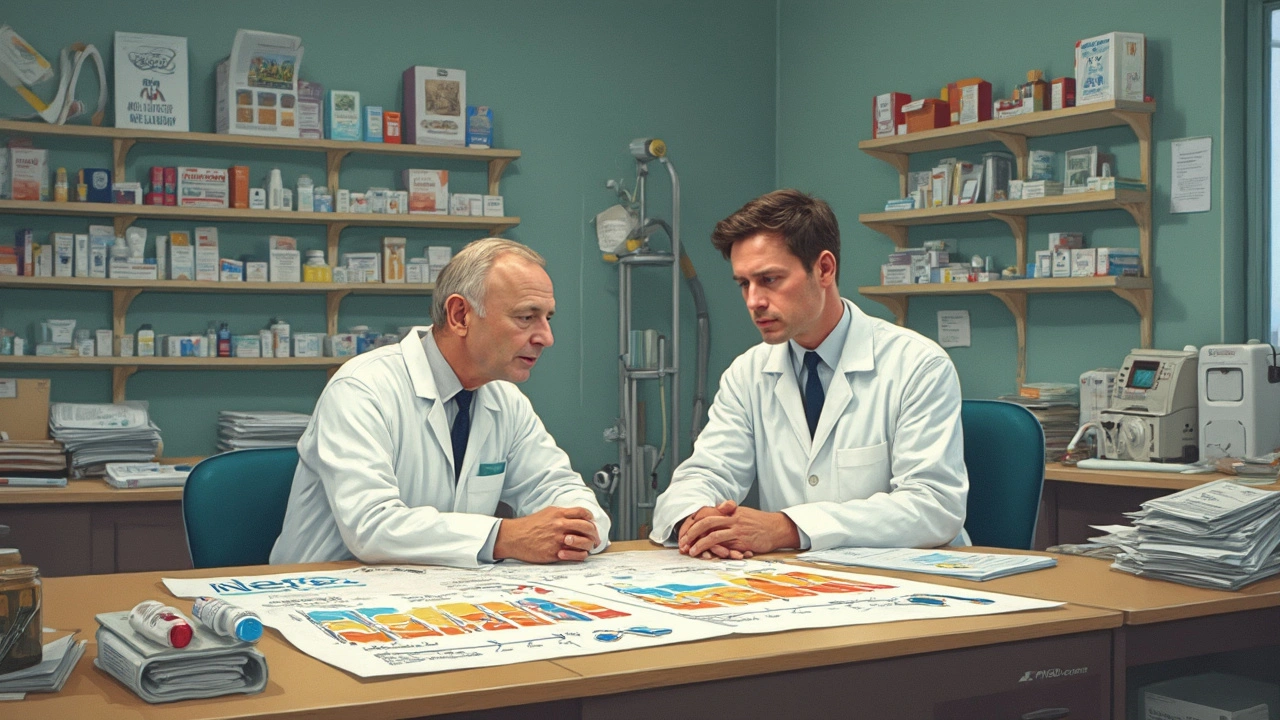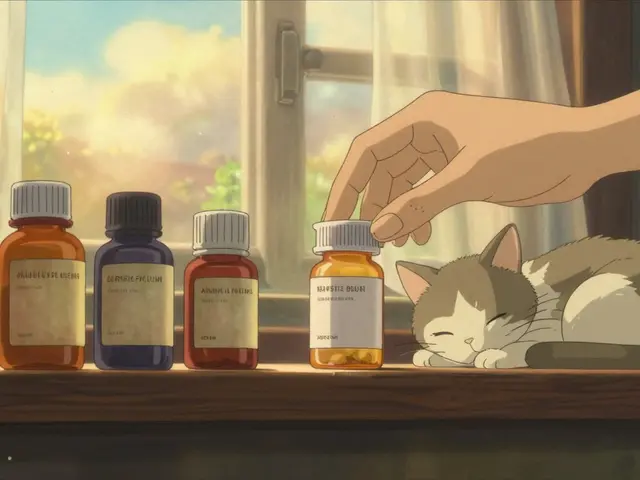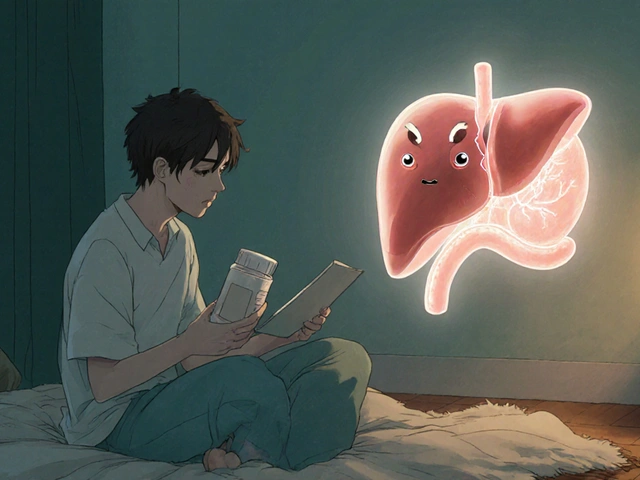
Remember the horror stories about people getting violently sick after switching depression meds? They're not just rumors. One mix-up, an impatient ramp-up, or a missed warning can flip a safe plan into an emergency room visit. Imipramine, an old-school but still commonly used antidepressant, sits right at the heart of this complicated web. The danger when combined with other medications—especially SSRIs, MAOIs, and other tricyclics—is real, and it’s not just theoretical. Every year, cases of serotonin syndrome—a potentially deadly reaction to too much serotonin—fill hospital beds across the world. The problem? Most people still don’t know how quickly things can go wrong, or how to read the warning signs before they get into trouble.
How Imipramine, SSRIs, and MAOIs Collide in the Brain
Imipramine belongs to a tough group called the tricyclic antidepressants (TCAs). While it’s not as commonly prescribed as the modern SSRIs, it’s far from forgotten—especially in treatment-resistant depression. Imipramine works by blocking the reuptake of both serotonin and norepinephrine, pumping up their levels in the brain. Sounds good, right? But there’s a catch. SSRIs (like fluoxetine and sertraline) also raise serotonin, and so do MAOIs (like phenelzine or tranylcypromine), but they use a different approach—blocking an enzyme that normally breaks down these neurotransmitters.
Here’s where things get hairy. Let’s say someone is already on an SSRI and tries switching to imipramine, or even worse, mixes it with an MAOI. The brain fills with so much serotonin that it starts going haywire. It’s a bit like a car’s accelerator getting jammed—except the car is your nervous system. As soon as two or more of these drugs combine, the risk of serotonin syndrome shoots up dramatically. That’s why prescribers get seriously anxious about these combos—the risk is not theoretical or rare. Missing just one critical piece about a person’s meds could send them spiraling fast.
Here’s a sneaky fact: Imipramine doesn’t just interact with SSRIs and MAOIs. Even over-the-counter drugs like cough syrups (containing dextromethorphan) or popular herbal supplements (such as St. John’s Wort) can pile onto the serotonin overload if you’re not careful. Sometimes, a person doesn’t even realize two medicines work through the same chemical paths. That’s how simple mistakes happen—and nobody wants to learn the hard way.
A Close-Up on Serotonin Syndrome: What It Really Feels Like
Serotonin syndrome doesn’t announce itself politely. People rarely recognize it right away because the symptoms start off feeling odd but not life-threatening: sweating, shivering, maybe a fast heartbeat and some twitchiness. It can easily look like a panic attack. But within hours, things can take a sharp turn—high temperature, muscle rigidity, jerky movements, and confusion that gets steadily worse. Sometimes, it's mistaken for the flu, a drug allergy, or even just nerves. But untreated, it can cause seizures, organ failure, or death. The reality is that most people have never seen these symptoms until it’s already too late. That's what makes it scary—it sneaks up, and it's fast.
The crazy part is, medical staff sometimes miss it too. Unless you know that someone’s started a new antidepressant combo, or switched therapies without a break, red flags get overlooked. There’s even a grim term for the worst cases: malignant serotonin syndrome. That’s when high fever and muscle breakdown lead to kidney failure or even a coma. Want to dodge this nightmare? Knowledge and timing are your best weapons. Remember, you only need the right combo—imipramine following an MAOI, or both drugs layered together—for the chain reaction to go off. The speed also depends on genetic quirks and how quickly the body processes these meds. If you think you, or someone in your family, is acting out of character or suddenly develops weird physical symptoms after a medication switch, don’t second-guess—get checked out straight away.

Timing Is Everything: The Science Behind Washout Periods
Okay, so what’s the safest way to switch between big-league antidepressants? It’s all about the washout period. This is the break you need when stopping one drug before starting another that could interact badly. It sounds simple, but the devil is in the details—SSRIs, for example, hang around in your system much longer than it says on the pill bottle. Fluoxetine (Prozac) can linger for up to five weeks because of its long half-life. Other SSRIs may clear faster, but it’s never an overnight thing. The general advice: let two full weeks pass after stopping an SSRI before kicking off an MAOI or a tricyclic like imipramine. With long-acting drugs like fluoxetine, it's closer to five weeks. Skipping or short-changing this gap is like playing Russian roulette.
It flips around if you're coming off MAOIs or switching the other way. MAOIs must be out of your system for at least two weeks before starting any new antidepressant that could boost serotonin. This isn’t just bureaucracy—these gaps are based on how fast your liver and kidneys break down the meds and how quickly your nerve cells recover from the chemical flood. Sometimes, especially with older adults or people with slower metabolisms, extra caution is needed. So even if you feel fine or want results fast, patience pays off. Think about what’s at stake. This is one area in medicine where shortcuts put people on the wrong side of statistics.
It sucks to wait, especially if you’re struggling with depression. But the risk isn’t just academic. Imagine trading weeks of careful waiting for an ER trip that could’ve been avoided. If your doctor doesn’t bring up the idea of a washout period, or if you notice new symptoms popping up after a med switch, it’s worth a call—just in case something was missed in the plan.
Everyday Choices: Spotting the Hidden Dangers in Other Meds and Supplements
Most people see their psychiatrist or GP for antidepressants, but the real trouble often creeps in through other doors. You might pick up an over-the-counter cold remedy, pop a migraine tablet, or grab an herbal supplement—all without thinking about hidden risks. Dextromethorphan, often found in cough syrups, has set off serotonin syndrome in people taking imipramine or SSRIs. Sumatriptan, used for migraines, can amplify serotonin problems. Even some anti-nausea meds given in hospitals (like ondansetron) can turn up the heat on serotonin levels. Want another twist? St. John’s Wort, sold everywhere as a ‘natural’ mood booster, works through similar pathways as prescription drugs and can tip the scales just as fast.
Basically, every time you add a new medicine, prescription or not, double-check what it might do to your main meds. The best move? Keep a physical or digital list of everything you take, and even better, bring it to every medical appointment—even dental visits. Most drug databases flag dangerous combos, but errors do happen. If you’re curious about how specific drugs play together, check resources like the imipramine drug interactions page for real-world examples. And always come at it with a bit of healthy skepticism—if something sounds like it might mess with your head (or your heart), ask. Pharmacies can usually double-check, too.
It’s not just about avoiding the headline risks, either. Layering drugs that work on the same brain chemicals can make side effects worse, even if they don’t land you in the hospital. You might find yourself with extra drowsiness, dry mouth, dizziness, or trouble urinating—all classic tricyclic symptoms that can be magnified by the wrong partner drugs.

Real-World Tips: How to Stay Out of the Danger Zone
No fancy advice here—just a blunt set of strategies that work for anyone taking imipramine or mixing antidepressants:
- Never stop, start, or swap medications without talking to your prescriber—even if you feel miserable. Abrupt changes are how mistakes happen.
- Keep an updated list of all your medications and supplements. It sounds old-school, but it saves lives. Apps can help, or just snap a photo on your phone.
- Educate yourself on the symptoms of serotonin syndrome. Share the list with someone you trust who can look out for you if you miss the signs.
- Push for a real conversation about washout periods. If a new med is being added quickly, ask why. There might be a good reason, or it could be an error.
- Check drug interactions online or with your pharmacist. The more eyes on your list, the better.
- If something feels off after a medication change—like tremor, sweating, mental fog, or rapid heart rate—err on the side of caution. Seek help straight away, especially if symptoms ramp up within hours or days of a switch.
The mental health system isn’t perfect, but being informed levels the playing field. Imipramine’s a valuable tool, but it demands respect and caution when it’s used alongside other medicines. Cavemen didn’t need to know about serotonin syndrome, but if you’re reading this, you probably should.
The science moves fast, but the basics don’t change: timing, communication, and vigilance save lives far more often than luck. Next time you’re handed a new script, or think about swapping meds without a plan, take a beat. Sometimes, slow is the only way to stay safe.
6 Comments
Write a comment
More Articles

How Long Medications Actually Remain Effective After Expiration
Most medications remain effective years after their expiration date - if stored properly. Learn which pills still work, which ones to avoid, and why expiration dates are more about profit than science.



Bradley Mulliner
May 26, 2025 AT 15:51People still don’t get it. You don’t just ‘switch meds’ like swapping out a phone charger. One guy I knew took fluoxetine on Monday, started imipramine Wednesday, and ended up in the ER by Friday with tremors and a 104°F fever. He thought ‘natural healing’ meant ignoring pharmacology. If you’re that careless, maybe you shouldn’t be on antidepressants at all.
It’s not rocket science. Washout periods exist for a reason. Dextromethorphan? St. John’s Wort? Those aren’t ‘harmless supplements’-they’re serotonin grenades. And no, your yoga instructor doesn’t know more about neurochemistry than your pharmacist.
Stop romanticizing ‘natural remedies.’ They don’t come with FDA warnings because they’re safe-they come with warnings because people keep dying from them.
And if your doctor doesn’t bring up interactions? Find a new one. This isn’t 1998. We have databases that flag these combos in seconds.
Blame the system? Fine. But your life? That’s on you.
Don’t be the reason someone else has to Google ‘serotonin syndrome symptoms’ while their muscles lock up.